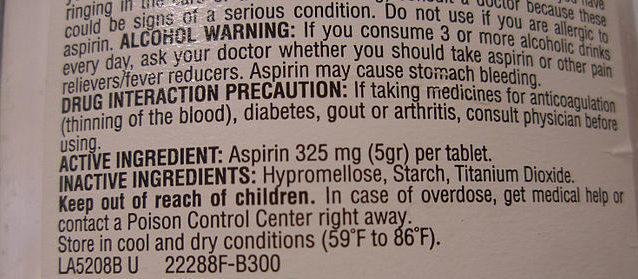Anti inflammatory. Why not Aspirin ?

This initial pharmacoepidemiological studies on patients treated with lithium does not establish a statistically significant association between the use of the whole class of drugs that inhibit PLA2 and/or COX enzymes and amelioration of BD symptoms.
That low-dose aspirin decreased the number of medication events, irrespective of prescription duration, is consistent with the hypothesis that inhibitors of brain PLA2 and/or COX enzymes would be beneficial in BD. This finding also is in line with results of a study indicating that acetylsalicylic acid produced positive mood-modulating effects in men undergoing coronary angiography.
Aspirin is considered to inhibit COX-1 activity much more than COX-2 activity, to downregulate transcription of the COX-2 gene, to elevate lipoxygenase-derived eicosanoids such as the anti-inflammatory lipoxin A4, and to acetylate COX-2 protein to a modified enzyme that can convert unesterified AA to anti-inflammatory mediators such as 15-epi-lipoxin A4. The acylated enzyme also can convert docosahexaenoic acid (DHA, 22:6n-3) to 17-(R)-OH-DHA, which, like its metabolites di(R)-OH-DHA (neuroprotectin (R) D1) and tri(R)-OH-DHA (resolvin (R) D1), is highly anti-inflammatory. Lithium given chronically to rats with lipopolysaccharide-induced neuroinflammation also increases the brain concentration of 17-OH-DHA (M. Basselin, M. Chen, S. I. Rapoport, R. C. Murphy and S. E. Farias, unpublished observations). Thus, there may be a synergy between aspirin and lithium in forming anti-inflammatory brain DHA metabolites. In this regard, neuroinflammation is reported in BD, and dietary DHA supplementation was found in some but not all clinical trials to be helpful in BD patients.
Contraindications.
Aspirin should not be taken by people who are allergic to ibuprofen or naproxen or who have salicylate intolerance or a more generalized drug intolerance to NSAIDs, and caution should be exercised in those with asthma or NSAID-precipitated bronchospasm. Owing to its effect on the stomach lining, manufacturers recommend people with peptic ulcers, mild diabetes, or gastritis seek medical advice before using aspirin. Even if none of these conditions is present, the risk of stomach bleeding is still increased when aspirin is taken with alcohol or warfarin. People with hemophilia or other bleeding tendencies should not take aspirin or other salicylates. Aspirin is known to cause hemolytic anemia in people who have the genetic disease glucose-6-phosphate dehydrogenase deficiency, particularly in large doses and depending on the severity of the disease. Use of aspirin during dengue fever is not recommended owing to increased bleeding tendency. People with kidney disease, hyperuricemia, or gout should not take aspirin because it inhibits the kidneys’ ability to excrete uric acid, thus may exacerbate these conditions. Aspirin should not be given to children or adolescents to control cold or influenza symptoms, as this has been linked with Reye’s syndrome.
Interactions.
Aspirin is known to interact with other drugs. For example, acetazolamide and ammonium chloride are known to enhance the intoxicating effect of salicylates, and alcohol also increases the gastrointestinal bleeding associated with these types of drugs. Aspirin is known to displace a number of drugs from protein-binding sites in the blood, including the antidiabeticdrugs tolbutamide and chlorpropamide, warfarin, methotrexate, phenytoin, probenecid, valproic acid (as well as interfering with beta oxidation, an important part of valproate metabolism), and other NSAIDs. Corticosteroids may also reduce the concentration of aspirin. Ibuprofen can negate the antiplatelet effect of aspirin used for cardioprotection and stroke prevention. The pharmacological activity of spironolactone may be reduced by taking aspirin, and it is known to compete with penicillin G for renal tubular secretion. Aspirin may also inhibit the absorption of vitamin C.
More research is needed to determine the benefits and risks of daily aspirin use in adults younger than age 50 and older than age 70 before a recommendation can be made for or against aspirin.
Daily aspirin therapy may lower your risk of heart attack, but daily aspirin therapy isn’t for everyone. Is it right for you?